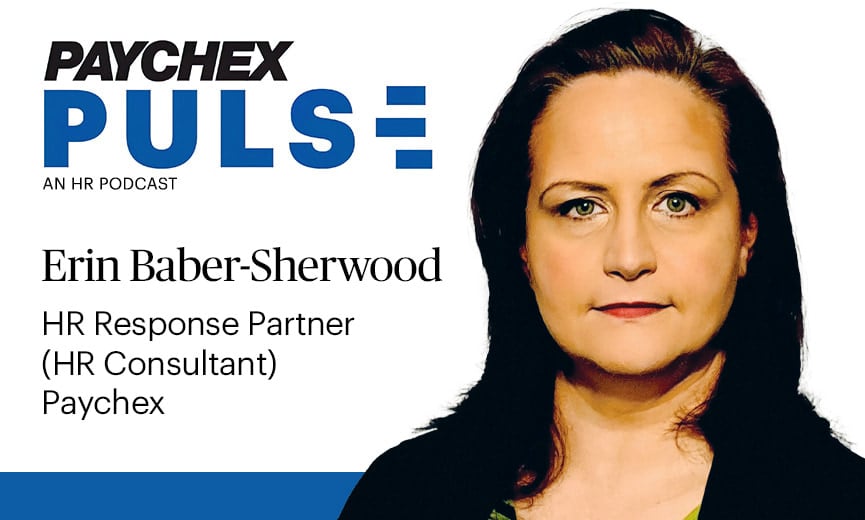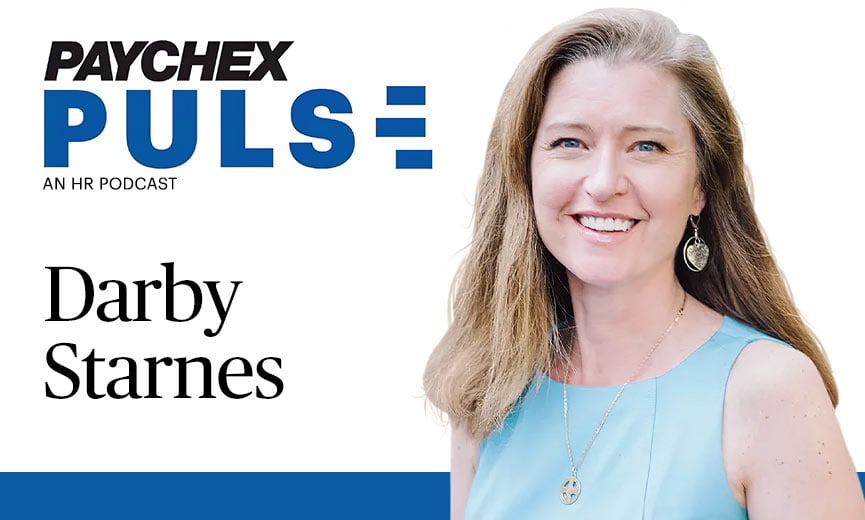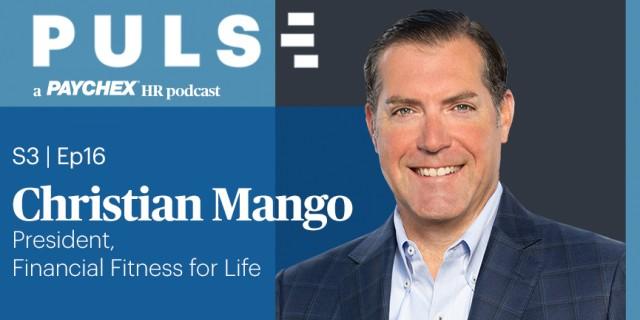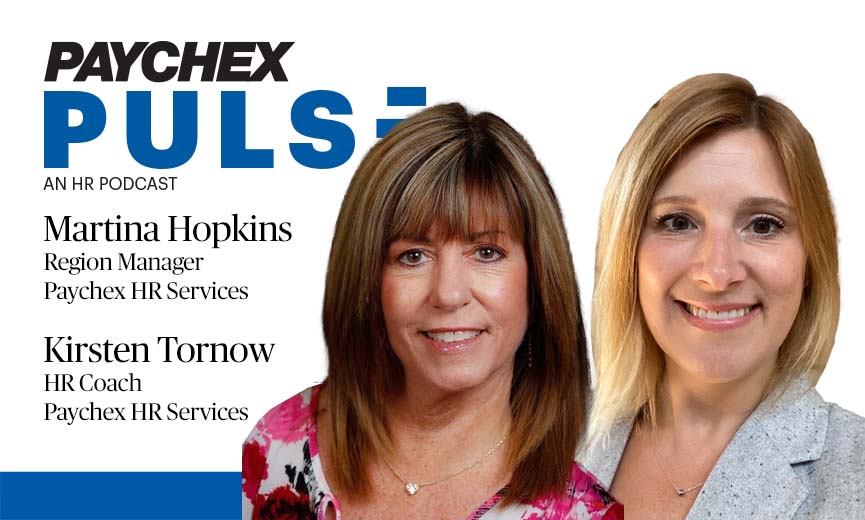Elevate Your HR with Analytics: 2023 HR Tech Series - Part 1
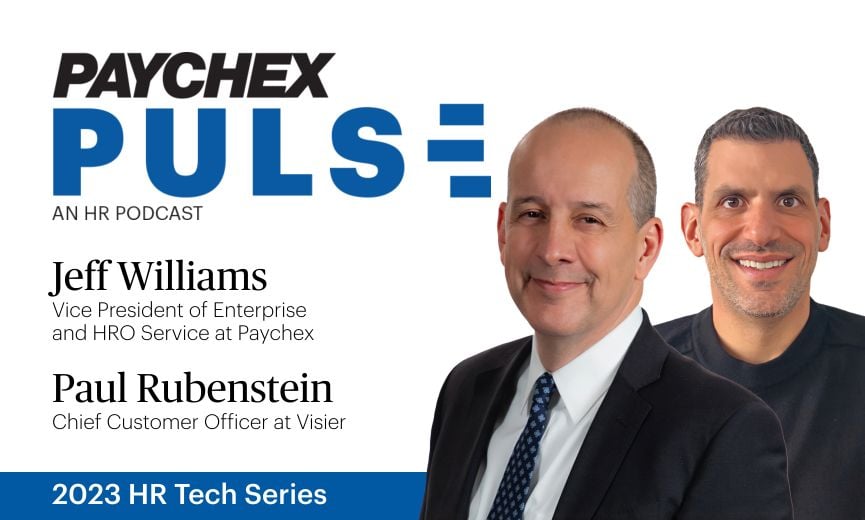
Podcast •

Vea
Resumen
Live from the floor of the 2023 HR Technology Conference, Jeff Williams, Vice President of Enterprise and HRO Service at Paychex, and Paul Rubenstein, Chief People Officer at Visier, join the podcast to delve into the intricacies of HR analytics, shedding light on the transformative power of data in HR. They discuss how unlocking the power of data can have a game-changing impact not just for HR professionals and teams, but for the entire organization. Tune in to hear the first episode in our series live from HR Tech as we help you keep your finger on the pulse of the latest advancements in the world HR.
Topics include:
00:00 – 2023 HR Tech Intro
01:09 – Welcome Jeff Williams and Paul Rubenstein
02:49 – Jeff and Paul’s history together in consulting
03:46 – Paul’s insights on recruiting technology from HR Tech
04:28 – Jeff’s insights on analytics from HR Tech
05:10 – The evolution and importance of HR analytics
06:40 – Using data to craft a story for the C-Suite
09:46 – The impact of the Paychex/Visier partnership on businesses of all sizes
13:09 – The importance of using data when making decisions
14:31 – Addressing hesitancies when using HR analytics
17:30 – The difference between reporting and analytics
18:30 – Wrap Up
Connect with Jeff:
> LinkedIn
Connect with Paul:
> Linkedin
> Twitter/X
Learn how to transform raw data into actionable insights with our HR Metrics Cheat Sheet.
Coming soon! Paychex and Visier partner to provide new benchmarking and people analytics. Read more.
Start preparing now for these 2024 HR technology trends.
Paychex doesn’t just have the HR analytics you need, but the expert guidance that helps you turn them into positive changes for your business. Learn more.
Ver transcripción
Paul Rubenstein (00:00)
The beautiful part is now you're seeing the difference between reporting and analytics is data in motion. You're being able to see trends. You're being able to show people a pattern of decisions and say, "The most important graph you'll ever create is if you do not change your ways, this is where you're headed." And that moment is a powerful moment between HR and all of the different constituents that it serves.
Rob Parsons (00:27)
Welcome to season four of Paychex PULSE, an HR Podcast, where HR professionals can find great insights on today's top issues and be inspired to build and lead effective teams in a healthier workplace. Hi, everyone, welcome to the Paychex PULSE podcast, live from the floor of HR Tech 2023. I'm your host, Rob Parsons. Joining me right now are Jeff Williams and Paul Rubenstein. Jeff is Paychex's Vice President of Enterprise and HRO Service. Jeff leads the teams that provide proactive advisory services to clients looking to navigate complex legislative and evolving employer landscape. Paul has more than 25 years of experience consulting and working in HR. He's the Chief Customer Officer at Visier, and before that, their Chief People Officer. Visier transforms raw data into meaningful insights, answers, and solutions to help organizations get a better understanding of their workforce and their business. Jeff, Paul, welcome to the podcast.
Paul Rubenstein (01:35)
Thank you.
Jeff Williams (01:35)
Great to be here.
Rob Parsons (01:36)
It's exciting, and I really like the energy on the show floor this year. I wanted to start because you told me an interesting story about how you two met, how you came up, and I think it'll lend some interesting perspective on what you're seeing at the show this year.
Jeff Williams (01:49)
Paul's version will probably be closer to the truth.
Paul Rubenstein (01:52)
Well, we both used to work at Bing Consulting, right? You know, going client by client, working through all of the issues that face employers and helping them contextualize it in the modern world. So that's, I don't know, 20 years in consulting? How many years you do?
Jeff Williams (02:08)
Several, several. Yeah, and one of the great things about working with Paul is, you know, I always felt like, he was based in our New York office at the time, and I always felt like his thinking was at the forefront of where our clients needed to go.
Paul Rubenstein (02:23)
Thank you.
Jeff Williams (02:23)
So, I always felt like I learned something when I worked with Paul.
Rob Parsons (02:27)
That's fantastic. So, we are certainly among the leading edge here at HR Tech. What's jumping out at you both, you know, in light of that experience?
Paul Rubenstein (02:36)
Want to go first?
Jeff Williams (02:37)
Go ahead.
Paul Rubenstein (02:37)
I have to say, there's like a couple of themes that I picked up on, and one of them is quite surprising, how much energy people are going back to on the basics of unpacking their recruiting stack. Like, if you look at the number of vendors around here that are doing parts of recruiting, nobody really does it all, does it? And nobody's satisfied still. And we've been through this economic cycle of change in technology going all the way back to Brassring and Taleo. And now you see AI coming into it and all the different parts. I mean, it's starting to look like the marketing tech stack where everybody wants every single technology, they can't just pick one or two. That was one of the things. I don't know, what else are you seeing?
Jeff Williams (03:19)
Yeah, for me, and I did a bit of a talk earlier today over at the Case Study Theater on it, it's the impact of analytics on a business, right? The ability to harness data that exists somewhere. The ability to unlock that data, to visualize that data, and to have that data turn into insights and actions. You know, I think the ability to solve basic HR problems in simple ways fueled by data, yes, there's a lot going on with artificial intelligence in the show, absolutely. But the idea of using analytics to fuel the HR mission, I think is forefront in what I'm seeing around the floor.
Paul Rubenstein (04:01)
And I think what's interesting about that is it's different than the first thing I mentioned, right? The first thing I mentioned was about efficiency of HR, right? And let's face it, like we grew up in a time where everybody was focused in all those transformation projects on the efficiency of HR. And so much of the software is around the efficiency of HR. But now efficiency is not enough. CEOs are looking at HR to say, "Show me the impact on people." People decisions are business decisions. The corporate performance gap is the people impact gap. And HR, it's not enough to just be compliant. It's just not enough to, you know, put butts in seats, right? You actually have to show the patterns, and this is where it comes in really, the patterns of insights that others can't see. And so, we have, like, kudos, to everyone in HR, kudos, you've done a lot of hard work over the last 20 years to get all of the HR record-keeping systems, the payroll systems, the benefit systems, you've got them humming right. But the interesting stuff happens when you look across all of those systems. When you start to look across all those systems and all the data and think about what it means for business and add business data to it, that's the analytics that Jeff is talking about. That's the pattern recognition, which HR has always had in its head because it sits outside and sees things, but now it can turn that into data, and it changes the conversation.
Jeff Williams (05:32)
Yeah, and let me build on that if I may. And I think what Paul's describing is some of why HR is stalled out in the C-suite. So, Stacey Harris at Sapient does a kind of a strategic indicator of HR. You've seen the research, and you know I think HR is a little bit stuck at this area. So, picture two trips to the C-suite. Trip number one, HR leader goes in and says, "Boy, I'm really concerned about turnover in our Chicago office, really concerned." Okay, that's opportunity number one. Opportunity number two is, "I'm really concerned about turnover in our Chicago office, because we're 20% behind our competitors based on the benchmark for compensation. I'm proposing, we don't go all the way, but we go 15%. I believe I can reduce turnover by 20% and I can provide an ROI if you approve this business case." Like, the nature of those conversations, if HR wants to continue to build that seat, unleash the data, you have to tell the story, to create the business case to drive the impact. Like, I just think there's so much opportunity there for us to do more.
Paul Rubenstein (06:49)
That's an awesome example by the way. Let's keep at that, right?
Jeff Williams (06:52)
Yeah, yeah.
Paul Rubenstein (06:53)
Because there's two things that happen in there, right? The first one is it was a data-driven conversation. The language of data. And for anybody in HR who I know you might not have gotten into HR to like work on Excel spreadsheets, et cetera, those days are passed, man. Like, you have to have mastery of your metrics, your numbers, and you have to have agility with that. And you have to speak in the language of the CFO, the CEO, and that is a language of numbers, and that's the second part of this. Who is really good at this? The CFO takes business strategy, they unpack it into a financial strategy, they turn it into a set of numbers that everybody sees. Man, we talk about hopes and dreams, and fun statements to motivate people, but, man, it is data that lights the path to accountability and change. And the more HR, which is very much focused on change, can turn that business strategy into a talent strategy and turn it into numbers, and help everybody connect the small decision about who I'm going to hire, who I'm going to pay, who I'm going to fire, who I'm going, you know, invest in, turn that into and understand how that is a number, and results in that set of collective decisions that actually shapes corporate outcomes, that's the magic. That's when HR has collapsed its distance to impact in turning numbers into strategy to outcomes. And that's a beautiful, beautiful part of it.
Jeff Williams (08:27)
Sí.
Paul Rubenstein (08:28)
Sorry.
Rob Parsons (08:29)
No, no, don't be sorry. I love it.
Paul Rubenstein (08:30)
Long answer.
Rob Parsons (08:31)
It was a great answer. And I think it's a great segue to the Visier-Paychex partnership. Because you're really, it's great to talk about numbers, but how do I really do it? How do I really make that happen?
Paul Rubenstein (08:45)
Do you want to go first? Why do you love the partnership? I have my reasons, what are your reasons, Jeff?
Jeff Williams (08:49)
Oh my gosh, so a few things. One is I've been an admirer of Visier for some time. You know, I've had a chance to see some of their customers at retail in a previous life. I was really impressed with the quality of the product, the quality of the people in the firm, so an admirer for sure. And that was a great baseline for the discussions we were having here at Paychex. So, the business challenge is one a little bit of what we were just talking about is how do we give access to information? How do we democratize that access? How do we make it simple to consume? How do we turn it into the ROI that every HR and business leader really needs? If you kind of think about our typical customer at Paychex, they're probably running an organization or running multiple parts of a smaller organization. They don't have time to dwell on HR statistics. They need those insights available; they need them to pop, and they need the case coming out of that to be clear. So, what we were looking for in enhancing our already really strong capabilities was a partner that could match that need, and one that kind of fit from a culture perspective, really client-centric, really excited about the partnership. You know, we're a mission-driven company, right? We want to give clients the freedom to succeed. Giving them access to this information all in one place, all in Flex, is just an incredible way to do that, and Visier is a great company to partner with to do that.
Paul Rubenstein (10:28)
Thank you, as is Paychex. And you actually fulfill the rest of my mission. When I think about my mom, right? She works at a small accounting firm. They're not doing people analytics, but you know what? They deserve to have the same elevated insights that a big company does, right? Quite frankly, like everybody deserves data-driven, fairer, unbiased, fact-based decisions about their career, managers want it. They want to know who is really going to leave versus not going to leave. They want to know, "Am I spending money on the right people?" And the employees love data-driven insights because it levels the playing field. It makes sure it's not just the person who has the loudest voice who gets the money and attention, it's the person who actually performs on their merits, and that's a magic, magic moment. And what you guys do in this partnership is you bring it to every size company, because everybody deserves better people decisions, and that's why I'm so excited.
Jeff Williams (11:31)
You picture just these massive data sets that we're sitting on at Paychex. Like, I fundamentally believe there is not an organization in the United States that knows small-to-medium business, and what's going on inside it, better than Paychex. You couple that with world-leading capabilities from an insights perspective, and, man, you got a powerful combination in the market.
Paul Rubenstein (11:56)
Okay, let's humanize that, because I'm with you. Because some people out there in HR are like, "I don't know, what does this mean really?" But every day, you know, if you're running a small business, every dollar counts even more, right? You know, you spend $1, $1 an hour in someone's salary makes a difference for them and you, your margins, your everything. So how do you choose that next best dollar? Wouldn't it be great to have insights that say, "What is the market data really? If I do this, what are the other factors that I can't see with my naked eye tell me about whether this person's really going to stay or go? Am I giving it to the right person?" All these little decisions are there, humanize that, but don't make it so technologically complicated. The same way we wake up in the morning, even if we've driven the same way, we pop on Google Maps and we go to check to see what the latest traffic report or if there's an accident. As humans, we rely on good data to make even the most routine decisions, things we used to do by insight and inertia, we now use data to inform us. Man, that's so important for people decisions. People decisions should not be made on instinct and inertia. They should be made on facts. Yes, informed by your experience, but facts have got to be part of it.
Jeff Williams (13:21)
Yeah, well said.
Rob Parsons (13:22)
And I love that point you made about Google Maps. Because there's a lot of talk about the technologies here, AI, all this, but that's really just a means to an end. And what you're both talking about is the end, what we're trying to get to here. Is there any change management, or leadership impact, or culture impact to make this really work? Because I've got to think you said it, inertia and experience. I'm used to doing things a certain way. Have you noticed pushback against this data-driven model at all?
Paul Rubenstein (13:56)
Yeah, absolutely. And it's fear of the unknown. It's fear of, you know, "I won't have the right answer." And I want to talk directly to the HR culture for a second, right? So, all of the things that has made HR great in the last 20 years, correct books and records, making sure people get paid on time and accurately, making sure their benefits are up and running, making sure that we're compliant with the law, making sure that we find the best talent, right? All of these different specialties have become really important. And a big part of it has been service, right? And HR is a trusted partner for the employee to give good service. And, in HR, we like to answer questions and we like to answer them accurately, okay? And now all of a sudden, when you see true analytics, the hardest part about analytics is sometimes it doesn't answer a question, but it gets you to a better question, and it changes the dialogue that people will have with you. So, somebody may come to you for a question in HR now that you're showing them more and interesting data, and you're going to have to have that moment that we all learn as adults, which is, "You know what? I don't know. Let's explore this together," or "Let me get back to you."
Jeff Williams (15:13)
Yeah, I've got one as well, and I think it's even probably a little bit more fundamental, which is I've seen over, and over, and over again, when we do get the data that we want, we don't like the story it's telling so we go chasing more data, because we hope that by torturing more data, it will confess the story that we came into the exploration with. And I think there has to be a level of maturity around data collection and data analysis that says, "I believe this is the right data set. I am at the end of my de minimis pursuit of incremental sources of data. I have what's good enough, because the enemy of progress is seeking perfection." And I think there's a real temptation to go after this perfect answer that does not exist. But if you make 10 decisions and seven of them are great, versus making one or two and endlessly pursuing more data, I think you're going to be ahead. You're going to get one or two wrong once in a while, but to me it's a much better answer.
Paul Rubenstein (16:21)
Because you're now moving, right? The beautiful part is now you're seeing the difference between reporting and analytics is data in motion. You're being able to see trends, you're being able to show people a pattern of decisions and say, "The most important graph you'll ever create is if you do not change your ways, this is where you're headed." And that moment is a powerful moment between HR and all of the different constituents that it serves. So, you just got to get used to it. You got to get used to that humbling moment that you may not have all the answers and you have to get other questions. You're going to see dirty data, right? The best way to clean your data is put in an analytics because it stays clean, because everyone sees it. People in glass houses, they have clean floors. But it is an upward spiral. It leads HR leaders to better, more interesting conversations about people.
Jeff Williams (17:14)
Glass houses and clean floors. I'm going to borrow that one.
Paul Rubenstein (17:15)
Any time.
Jeff Williams (17:17)
I had not heard that one.
Rob Parsons (17:18)
Yeah, that's a good one.
Jeff Williams (17:18)
Do you like that one? I thought it was great.
Paul Rubenstein (17:19)
Yeah, I appreciate that.
Rob Parsons (17:20)
Gentlemen, this was a fantastic conversation. I so much appreciate you taking the time today.
Jeff Williams (17:26)
Thank you.
Paul Rubenstein (17:26)
Always a pleasure. We look forward to the partnership. Go look at your data.
Jeff Williams (17:30)
Great to hang with you, and great to see you.
Rob Parsons (17:33)
Awesome, thank you so much.
Paul Rubenstein (17:34)
Okay.
Rob Parsons (17:35)
And thank you to our listeners as well. I hope you're enjoying this series live from the show floor of HR Tech. It's been really exciting. As always, please stay happy and healthy. Be sure to subscribe to this and our "Paychex Thrive" business podcast on your favorite podcast platform. Looking for more ways to keep your finger on the pulse of industry dynamics? Visit our Resource Center for the latest research, thought leadership, and news at paychex.com/worx. That's W-O-R-X. Thanks again for joining us. Until next time, please stay happy and healthy.
Announcer (18:12)
This podcast is property of Paychex, Incorporated, 2023. All Rights reserved.

 Apple Podcast
Apple Podcast Spotify
Spotify iHeartRadio
iHeartRadio
